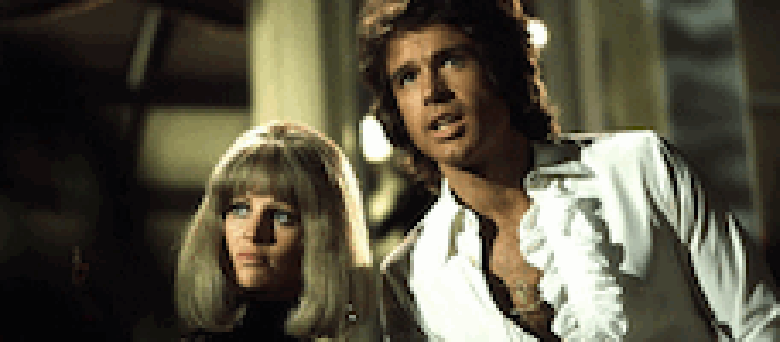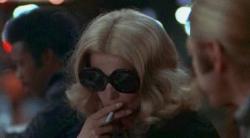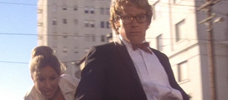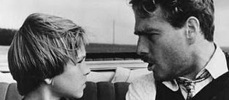Reviews
Hal Ashby
USA, 1975
Credits
Review by Leo Goldsmith
Posted on 29 May 2010
Source Sony Pictures DVD
Categories Seventies Screwball
“Wanna fuck?” is not the sort of question you’d expect, say, Irene Dunne to ask of Cary Grant—or, for that matter, Ralph Bellamy. Indeed, the young Carrie Fisher’s proposition to Warren Beatty, an offer of casual sex by a rich-girl to her mother’s hairdresser and lover, seems quite remote from the allegedly more subdued sexual politics put forward by the 1930s screwball comedy. And yet, for lack of more tactful term, fucking is as much at issue in 1937’s The Awful Truth as it is in 1975’s Shampoo, though the former film addresses the subject rather more indirectly.
In McCarey’s film, the fact of infidelity presents itself at the outset, though it is rendered in euphemism: Grant returns from two weeks in “Florida” without a suntan, and Dunne from a night out at an “inconvenient inn” with her singing coach. Hal Ashby’s film raises the issue immediately as well, but does so rather more bluntly: with the coupled sounds of “Wouldn’t It Be Nice” and the sound of Beverly Hills hairdresser George Roundy and his wealthy client Felicia Karpf in the throes of you-know-what. It’s a sly contrast, the Beach Boys’ chaste fantasy of a permissive world in which “there wouldn’t be a single thing we couldn’t do” punctured by the audible evidence of two people simply doing it. But the ironic discord fits the times: it is the night before the presidential election of 1968, a time of free love and costly war, and the Wilsons’ guileless ode to premarital sleepovers, spooning, and maybe even marriage has long been bulldozed to make way for the more liberated late-sixties sensibility.
But George and Felicia are only one duo in a small subculture of coupling. There is George’s largely unwitting girlfriend Jill (played by Goldie Hawn with maximum sunshiny credulity), an actress who is herself engaged in a little flirting with her young director, Johnny. And then there is Felicia’s husband Lester, a fat-cat businessman who also happens to be screwing Jackie Shawn, Jill’s best friend and George’s former flame. Far from the organic, obligation-free environment envisioned by the sexual revolution, the corner of Los Angeles that clusters around George’s beauty shop is as tangled as a weave and about as genuine—a world obsessed with its own appearance, in which characters conduct entire conversations without looking away from their own reflection in the mirror.
Encomia to the end of the 1960s abound, especially at the end of the 1960s itself, and Ashby’s film, coming in 1975, is one of its definitive postmortems. Shampoo had been a pet project of Beatty, its proactive producer-star-screenwriter, for some years—indeed, since at least the time of the events ultimately depicted in it. During its long gestation, these events - most importantly the election of Richard Milhous Nixon to the highest office in the land - had come, gone, and even repeated themselves. To many, this signaled a cataclysmic shift, a moment in which, seemingly all at once, America split in two, divided into the binaries of young and old, hippie and straight, poor and rich, Democrat and Republican. For Beatty, who had worked as an advisor to George McGovern’s 1972 presidential campaign, this sudden severing of America was a particularly sore subject. And Shampoo, the project he had nurtured and argued over with co-writer Robert Towne for the better part of a decade, expresses this bitterness and regret in obsessively personal terms.
For one, the character of George Roundy, who services the heads of many a wealthy lady, bears more than a passing resemblance to the star persona of Warren Beatty, and not just because he is involved with women played by Julie Christie and Goldie Hawn, two of Beatty’s most famous ex-girlfriends. His every accessory is a symbol of sexuality - the Triumph motorcycle he races around town, the ankh necklace embedded in his chest-hair, the blow-dryer jammed down his pants like a pistol - and every woman is called “baby.”
But George, though a great hairdresser and connoisseur of all things feminine, is nonetheless largely a failure at everything else. “I’m disgusted with my life,” George tells girlfriend Jill in virtually the same breath that he boasts, with questionable diction, that he is also “at the epitome of my life.” Indeed, what he epitomizes is the classic Warren Beatty archetype: one of the many dopes in his personal pantheon of beautiful weaklings, right next to his pimp-entrepreneur in McCabe & Mrs. Miller and Ishtar’s Lyle Rogers. He’s nearly broke, stretched thin, and caught in a variety of lies (“She has a pancreatic ulcer”). But worst of all, the ambitious but dim George is entirely shut out of the law and language of the straight economy: when applying for a loan at the bank, the closest thing he has to a credit reference is, “I do Barbara Rush.”
The only economy that George understands - and, through his good lucks and charm, has access to - is the economy of beauty, of which Los Angeles is the major industrial hub. TV, movies, and modeling all feed the demand for this precious commodity, though George’s line of work often veers closer to prostitution. He protests this designation, of course—for him, the sex is a necessary, but enjoyable perk of the job. “I don’t fuck anybody for money. I do it for fun,” he protests to Jackie, who seems less scrupulous about her status as a kept woman. (“Lester is really great. It’s so great to wake up in the morning with your rent paid.”) But his “additional services” and her own life as Lester’s concubine make them equals: beholden to the Karpfs of the world.
Like Nixon, Lester portrays himself as a practical man with good intentions, who merely wants “to bring this country together,” but his real desires are for more money, influence, and beauty to possess. Through Jack Warner’s performance, Lester becomes not an out-and-out villain, but a largely unwitting hypocrite, so perversely self-centered that he’s largely unaware of what’s going on at his wife’s or his mistress’s home. This dishonest and self-absorption makes Lester the prime specimen of a corrupt straight culture, and it takes Jackie, soused at Lester’s Nixon-Agnew Election Night party, to expose it. Told by one of Lester’s lascivious cronies (played, incidentally, by B-movie producer William Castle) that “I could get you whatever you want,” she juts a thumb at George and memorably declares, “What I really want is to suck his cock.”
Here again, this is not exactly the sort of thing you’d expect Irene Dunne to declare about Cary Grant, but it’s nonetheless not so far off from her own embarrassing-drunk act at the end of The Awful Truth. Christie, who here proves herself a very gifted comedienne, updates the act by playing a character who is actually drunk, but the sentiment from both heroines is the same: “Screw polite society—this man is mine!” In both films, the pompous pretensions of the straight social world must be exploded before the principal characters can realize that they are equals and in some sense bound to one another. But while The Awful Truth manages to reconstruct the mythology of love - to effect, as Stanley Cavell has termed it, a comedy of remarriage - Shampoo offers no such happy ending. For George and Jackie, the world is too tainted, too exhausted by the ruptured ideals of late-60s America to repair the bond. They do not reunite, at least not for more than a few minutes, and it seems the innocence of the Beach Boys’ ballad of conjugality is irrevocably lost: Jackie returns to Lester and George to his pursuit of Lester’s notion of the American Dream. The more awful truth of Shampoo is that both the narrow-mindedness of the straights and the “whatever” apathy of the hippies win out over the balanced madness of love. And it’s a true bummer, because it would have been nice.
More Seventies Screwball
We don’t do comments anymore, but you may contact us here or find us on Twitter or Facebook.








